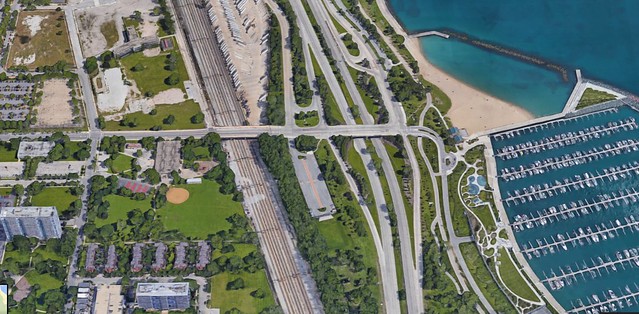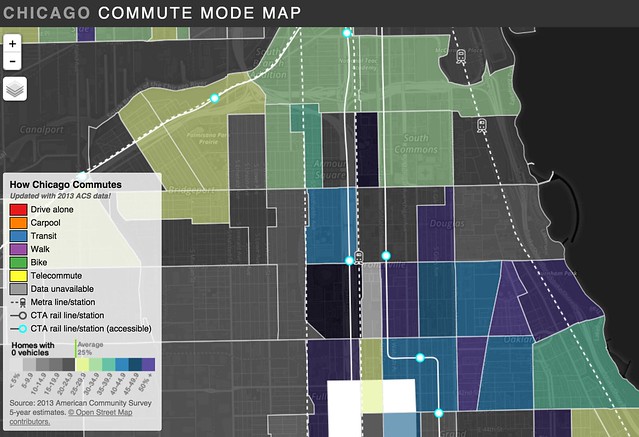
[Last year the Chicago Reader launched a new weekly transportation column written by Streetsblog Chicago editor John Greenfield. This partnership allows Streetsblog to extend the reach of our livable streets advocacy. We syndicate a portion of the column on the day it comes out online; you can read the remainder on the Reader’s website or in print. The paper hits the streets on Thursdays.]
It's another case of parks versus parking lots.
The Chicago Park District plans to put more than 250 new parking spots near the recently revamped 31st Street Beach and Harbor, in addition to the more than 650 existing garage and surface lot spaces already available within a roughly five-minute walk of the beach. That would make for a whopping grand total of more than 900 stalls at the lakeside facility.
On top of that, to make room for the additional parking, the project would involve the elimination of 85,000 square feet of existing green space south of a current car park.
The Park District says the additional parking is meant to accommodate future demand for access to the 900-slip harbor—although a spokesperson admits the department hasn't conducted a parking demand study.
But here's what really gets me: the parking lot expansion has been endorsed by none other than Friends of the Parks, the same group that helped tank George Lucas's proposal to replace Soldier Field's 1,500-space south lot with his Museum of Narrative Arts.
"Friends of the Parks has been hearing from stakeholders as well as the Chicago Park District about the great demand for parking for both beachgoers and boaters at the 31st Street Beach," executive director Juaniza Irizarry said via e-mail this week.
I've had mixed feelings about Friends of the Parks' previous advocacy work. I respect the group's role as a guardian of our city's recreational spaces—working, for example, to stop private music festivals from destroying public parks. It's also taken progressive stances on parking at other parks. Still, I saw its stance in rejecting the Lucas Museum as a case of letting the perfect be the enemy of the good.

In the case of 31st Street Beach, I think the group's support for the parking expansion is misplaced. The number of planned car spaces seems excessive, and too much parking is always a bad thing. Not only would the elimination of one-and-a-half football fields' worth of green space be unfortunate, but adding all that tarmac would contribute to the city's storm-water runoff and heat-island woes.
The city should accommodate people who may truly need to drive to the beach, such as those with mobility challenges, families with small children, and boaters and barbecuers transporting bulky gear. But overbuilding parking creates "induced demand"—if residents believe it's easy to drive to the beach, they're more likely to do so rather than use other, more sustainable forms of transportation. The result is more congestion and pollution.
That's one reason the Active Transportation Alliance opposes the 31st Street Beach lot expansion. "Car parking and streets are a poor use of the city's very limited park space. Let's give people MORE open space, play areas, trails and other attractions and LESS pavement for cars," executive director Ron Burke says via e-mail. "Focus on better access via biking, walking and public transit and remote parking with free weekend shuttle service. Apply market rate parking to help pay for these improvements -- the park district undercharges for much of its parking."
But Irizarry argues that adding parking at the 31st Street is an equity issue. The harbor, completed in 2012, includes a large garage topped by an inviting, nautical-themed playground.
"Unfortunately, Chicago's south side beaches and parks were disinvested for many decades, and historic discrimination against minority communities in Chicago is a well-known theme," Irizarry says. "Despite our own historic concerns about losing green space in favor of parking and other development, now that the south side has a lovely lakefront amenity that is finally being highly utilized, Friends of the Parks is not going to tell people of color that they can only utilize the beach if they arrive by CTA or bicycle."
There are a couple of problems with that logic.




